We studied and review the close connection between yoga and dementia. It’s a great way of improving the lives of people with dementia.
While there is still no cure for dementia, research indicates that yoga plays a huge role in improving symptoms and the quality of life not only for people with the illness but their caregivers as well.
The primary components of yoga are postures which are series of movements that are designed to increase breathing, strength, and flexibility.
Contents
Yoga & Meditation may Reduce Dementia Risk
The practice originated in ancient India and has been adapted in different parts of the globe in various ways.
Modern yoga incorporates breathing exercises, meditation, and various poses.
It is usually referred to as MBI (mind-body intervention) implying it focuses on the relationship between the brain, body, mind, and behavior as well as their effect on health and disease.
Below we discuss how yoga can help individuals with dementia through yoga and dementia research, how the practice benefits people with dementia, and chair yoga.
Research on Yoga and Dementia
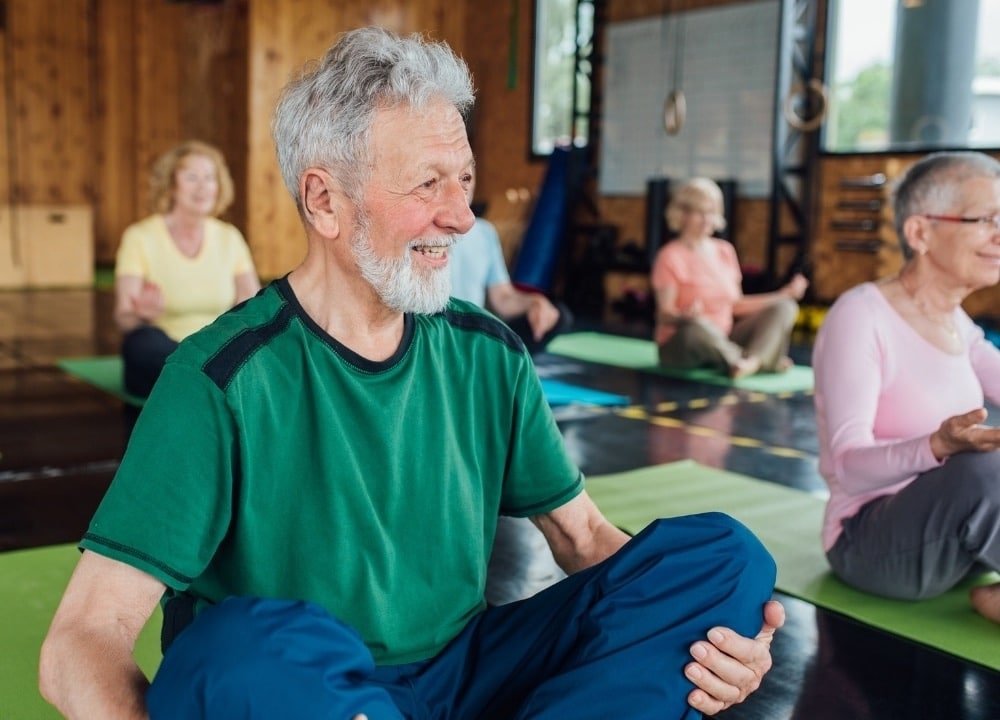
Multiple studies have found that practicing yoga is beneficial to persons with dementia. One of them is a small British study that was conducted in 2014.
It showed that meditation and yoga ease the burden for persons who have dementia. The study was published in the Journal of Bodywork and Movement Therapies.
The lead author of the study Yvonne J- LYN Khoo a researcher at the Health and Social Care Institute at Teesside University in the UK explained that yoga is an activity that individuals with dementia and their caregivers can do together.
This allows participants to let go as they enjoy some peace of mind.
Meditation and yoga are helpful for persons who have dementia.
They engage different sections of the brain based on various aspects of the practice that include chanting, pranayama, asana, and different levels of concentration.
These facets can assist the brain form new connections through neuroplasticity stimulation.
Yoga and medication can reduce risk of dementia
Another study concerning yoga and dementia revealed that yoga and meditation might help to reduce the risk of dementia in older adults.
The novel study was published in the Journal of Alzheimer’s Disease. This study was led by researchers from UCLA (University of California-Los Angeles including Dr. Helen Lavretsky from the Department of Psychiatry.
The professionals enrolled 25 participants age 55 and above. 14 participants took part in Kundalini yoga once a week for an hour. They also practiced Kirtan Kriya meditation for 20 minutes daily.
Kundalini yoga is also known as “yoga of awareness” incorporates changing postures, breathing techniques, and meditation.
On the other hand, Kirtan Kriya meditation involves hand movements, chanting, and light visualization.
The rest of the participants engaged in one hour of memory enhancement training. Using activities like computer training and crossword puzzle once a week for twelve weeks.
They also spent 20 minutes every day completing memory exercises.
All the participants completed memory tests and they also underwent (fMRI) functional magnetic resonance imaging before and after the study.
This was to help researchers assess their brain activity and cognitive function.
Yoga vs Memory Exercises
At the end of 12 weeks, the team discovered that both groups showed improvements in verbal memory skills. This was the ability to remember lists of words and names.
However, the participants who were engaging in meditation and yoga demonstrated greater improvements in visual-spatial memory skills.
This refers to the ability to remember and navigate locations.
Furthermore, the group practicing yoga and meditation fared better when it came to levels of depression and anxiety as well as stress resilience and coping skills.
Researchers suggested that the improvements in mood, memory, and stress resilience seen with meditation and yoga may be caused by the increase in the production of a protein known as BDNF (brain-derived neurotrophic growth factor).
This is responsible for boosting connections between existing brain cells and maintaining the survival of brain cell connections.
The researchers believe that the results of their study may be an indication that meditation and yoga can be an effective strategy when protecting older adults against cognitive decline.
Let’s look into some of the benefits that yoga offers persons with dementia.
Benefits of Yoga for Persons with Dementia
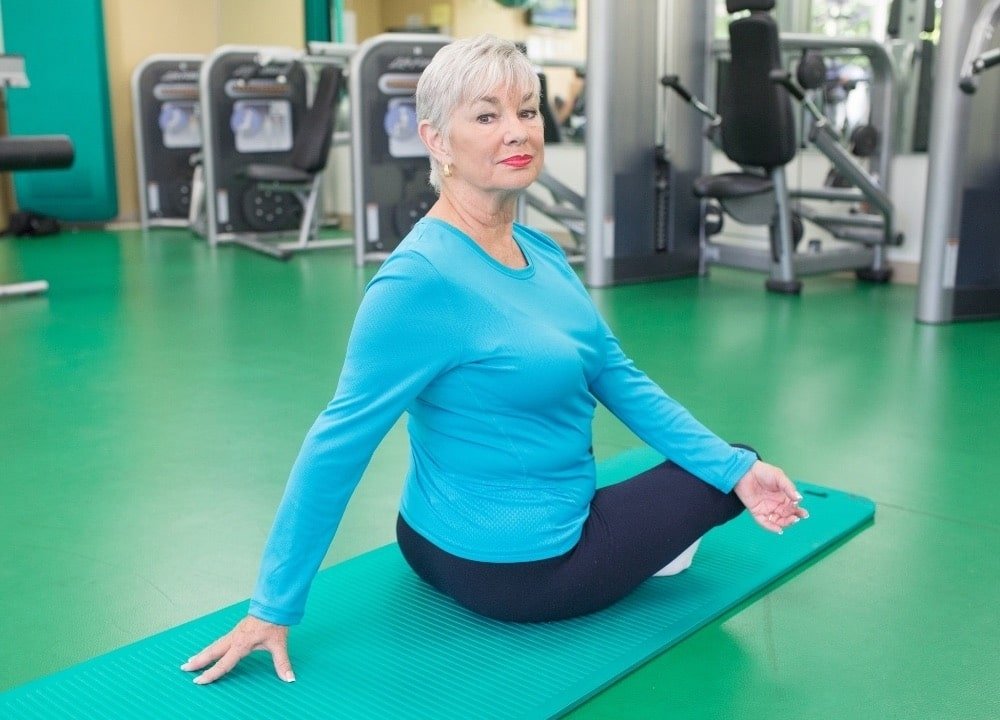
Depending on a person’s abilities, most yoga for people will dementia involves gentle movements that are performed easily and slowly manner.
Yoga classes often last anywhere from 10-30 minutes. Professional yoga trainers can tailor the sessions to meet the motor skills and physical capabilities of the participants.
Instructors do not force movements and participants are usually encouraged to complete the movements they can.
It helps persons with the progressive illness feel a sense of empowerment and self-determination.
Yoga offers plenty of benefits for persons living with dementia and some of them include:
Helps to Reduce Stress
Jonathan Graff-Radford, MD a behavioral neurologist at Mayo Clinic in Minnesota states that yoga is safe, good for mental health, and it can help reduce stress levels.
Many people with dementia suffer from stress which activates the body’s fight-or-flight response.
This can trigger a rise in blood pressure, heart rate, and release of stress hormones that have negative effects on the cardiovascular system.
Yoga helps to activate the rest-and-digest response which is the opposite effect. This causes the parasympathetic nervous system to act as a brake that dampens the stress response which is caused by stress hormones.
Practicing yoga regularly fosters the growth of the relaxation response allowing individuals to be less reactive to stress.
Helps Improve Sleep
NCCIH (The National Centre for Complementary and Integrative Health) suggests that yoga helps to improve sleep.
Most people with dementia often experience sleep issues. They end up not getting enough sleep and rest which can cause other behavioral symptoms to develop including agitation, anxiety, and many more.
Develops Inner Awareness
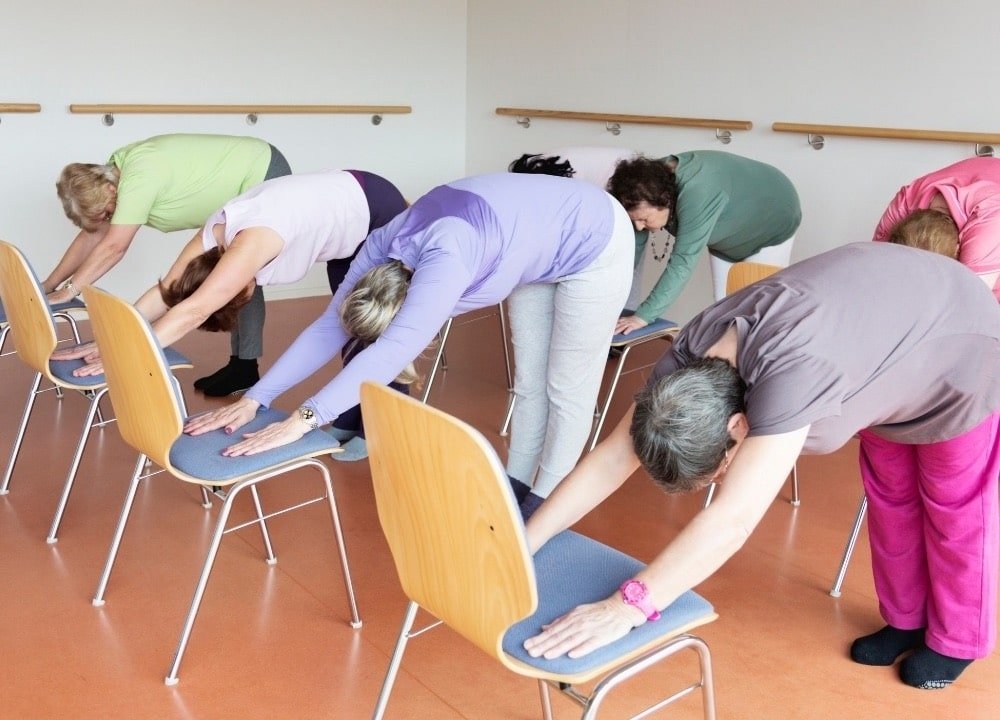
Yoga helps to develop the strength of the body and mind. It helps a person connect more with themselves because they do not only focus on the physical appearance.
Enhances Fitness
Yoga is also known to have a positive impact on a person’s ability to work out.
Practicing yoga enables a person to have greater flexibility, endurance, strength, and cardio-respiratory fitness.
Boosts Immunity
Some yoga poses can help boost a person’s immunity. An example is the bhastrika pranayama which helps to improve blood circulation and concentration as well as relax the body and mind.
It is also helpful for relieving depression, hypertension, and stress.
Other general perks that people with dementia can enjoy while practicing yoga include:
- Increased blood flow to the brain which makes it function better. This can result in improved memory as well as increased brainpower.
- Increases oxygen levels and improves the breathing process. Yoga has also been known to improve the quality of oxygen in the whole body.
- Balances hormones and emotions in the mind.
Types of Yoga Poses that can Help Individuals with Dementia
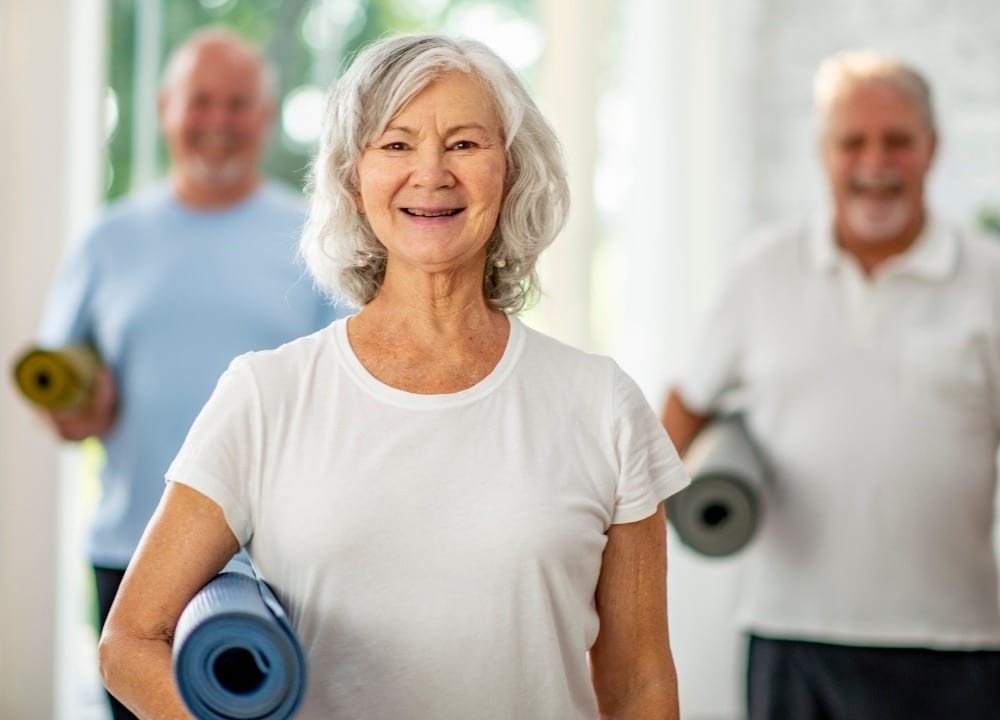
There are different types of yoga that individuals with dementia can participate in. One of the most popular is known as Hatha which is a combination of many styles.
It primarily focused on breathing-controlled exercises (pranayamas) and yoga postures (asanas) which end with a resting period (savasana).
However, there is one type of yoga that most people with dementia practice especially as the disease progresses and this is known as chair yoga.
Below is a highlight of what yoga is all about.
Chair Yoga
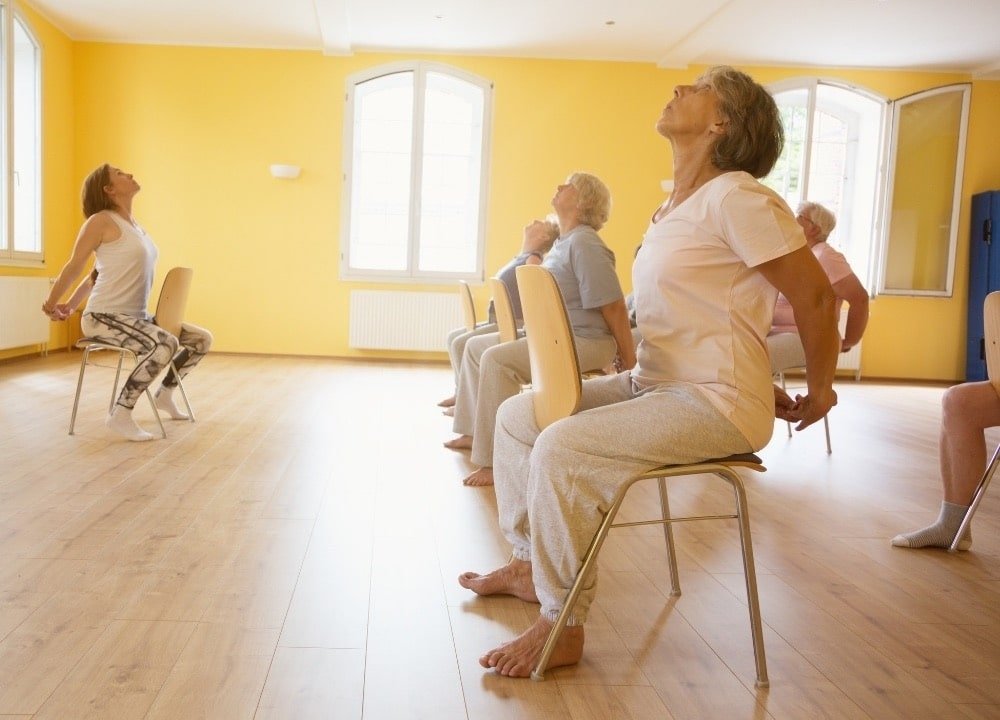
Chair yoga is a great option especially for persons with dementia who cannot handle too many yoga moves while standing.
It offers an opportunity for participants to stretch, improve flexibility and strengthen muscles while using a stable chair that offers balance.
Chair yoga also offers important relaxation and breathing techniques through stationary poses as well as guided relaxation that target different muscle groups.
A study from Florida Atlantic University confirmed that chair yoga can help improve the quality of life for people with dementia. The participants of the study were older adults with moderate to severe dementia.
Participants attended 45 minutes sessions two times a week for twelve weeks. The results indicated that over 97% of the participants were fully engaged in all the sessions.
Juyoung Park, Ph.D. the lead author of the study stated that even though some participants showed mild levels of wandering or agitation before the yoga sessions, they became attentive and calm when yoga interventionists began demonstrating yoga poses.
He continued to say that even though some did not understand verbal instructions from the interventionist, they still followed the poses from the instructor.
Yoga and Dementia Closing Remarks
Research around the impact of yoga on dementia is still inconclusive and limited to some degree.
More studies and clinical trials need to be conducted in regards to yoga and dementia to give a clearer picture of how yoga helps.
Note that a person who has dementia must consult their doctor before trying out any yoga therapy to be on the safe side.







